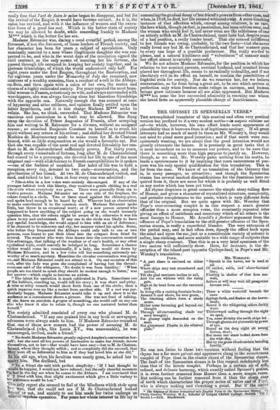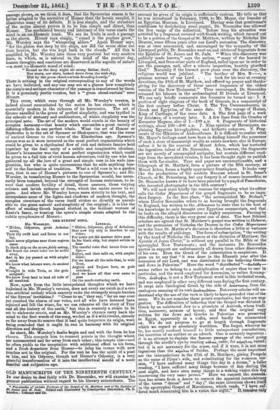TH_E ODYSSEY IN SPENSEILT.AN VERSE.*
TrIn accomplished translator of this musical and often very poetical version has prefixed to it a very modest motto—in inagnis voltam sot est—to which, however, his own effort lends more appearance of plausibility than it borrows from it of legitimate apology. If all great attempts had as much of merit in them as Mr. Worsley's, they would not need to plead mere good intention ; and if that merit were con- spicuously wanting, we are afraid that the good intention would not greatly extenuate the failure. It is precisely in great tasks that it is most incumbent on us to measure our powers, and to be sure that there is something more than high purpose to justify us. However,' though, as we said, Mr. Worsley gains nothing from his motto, he lends a speciousness to it by implying that mere earnestness of par. pose was his only special qualification for this translation. This is far from the case. We know of no translation of the Odyssey that is, in many passages, so attractive; and though the Spenserian stanza has several marked disqualifications for the functions here re- quired from it, there are some for which it is probably as well fitted as any metre which has been yet tried.
All rhyme disguises in great measure the simple story-telling flow
of Homer, and gives a character of crystallized structure, complexity, and periodic completeness to the poem, which is very different from that of the original. But we quite agree with Mr. Worsley that Pope's ever-recurring couplet is in this respect a much .greater offender than a more complex verse, the constantly repeated letter giving an effect of antithesis and monotony which of all others is the most foreign to Homer. Mr. Arnold's a fortiori argument from the offences of Pope's translation to the still greater offences of the Spen- serian stanza, is really a superficial blunder. The very extension of the period may, and in fact often does, liquefy' the effect both upon the mind and upon the ear, just as a considerable variety of colours is softer, less striking, and more suitable to a wide range of subjects than a single sharp contrast. That this is so a very brief specimen of the two metres will sufficiently show. Here, for instance, is the de- scription of the island-port opposite Cyclops-land, in Pope's and Mr. Worsley's translation; POPE. Ma. Wousr.nr.
"A port there is enclosed on either "Smooth is the haven, nor is need at side all Where ships may rest unanchored and Of anchor, cable, and ' shore-fastened untied, line; Till the glad mariners incline to sail, Floating in shelter of that firm sea- And the sea whitens with the rising wall, gale. Sailors at will may wait till prosperous High at its head from out the caverned breezes call.
rock In living rills a rushing fountain broke ; Aronnd it and above, for ever green, The blushing alders form a shady scene.
Hither some favouring god beyond our thought Through all-surrounding shade our navy brought ; For gloomy night descended on the main Nor glimmered Plicate in the ethereal
There a white waterfall beneath the
Clive
Springs forth, and flashes at the haven- head Round it the whispering alders darkly wave.
Thitherward sailing through the night we sped, Yea, some divinity the swift ships led Through glooms not pierceable by power of eye. Round us the deep night air swung listless, dead ; Nor moon nor stars looked down from the wide sky,
Hid by the gross cloud-curtain brooding heavily.', No one can listen to these two versions without feeling that the rhyme has a far more potent and oppressive clang in the monotonous couplet of Pope than in the elastic chord of the Spenserian stanza. The fault of the Spenserian stanza is in this respect indefinitely less than that of the heroic couplet. Perhaps in a certain air of soft, refined, and delicate harmony, which exactly suited Spenser's genius, it is even, further removed from Homer than a more simple verse. But nothing can be further removed from it than the sharp snap of teeth which characterizes the proper metre of satire and of Pope, who is always making and clenching a point. But if the above * The &limey of Homer translated into English Verse in the Spenserian Stanza, By Philip Stanley Woreley, MA., Scholar of corpus Christi College, Oxford. VOL I. Books I.—XLX. Blackwood. passage shows, as we think it does, that the Spenserian stanza is far better adapted to the narrative of Homer than the heroic couplet, it illustrates many of its defects. It is less simple, and the structure of the metre almost proves it to be less simple and direct, than Homer. The modulated beauty and intricacy of the verse starts the mind in an un-Homeric track. We see its fruits in such a passage 35 the above. Homer says simply, "round it the poplars grow," Mr. Worsley says the " whispering alders." Again Homer says, "for the gloom was deep by the ships, nor did the moon shine out from heaven, but she was kept back in the clouds." All this is amplified by Mr. Worsley into three very poetical but very modern lines, in Which, as is natural to the mind of the present day, human thoughts and emotions are discovered lathe aspects of nature —a most un-Homeric mood of mind: "Round us the deep night air swung listless, dead; Nor morn, nor stars, looked down from the wide sky, Hid by the gross cloud-ctwtain brooding heavily."
There is nothing in the original corresponding to any of the words we have italicized, and any one may see at a glance low completely the simple and antique character of the passage is transformed by them. It is a genuinely poetic version, but a "gross cloud-curtain" over Homer.
This error, -which runs through all Mr. Worsley's version, is indeed almost necessitated by the metre he has chosen, which is essentially modern in the richness of its harmonies. The art of Greece excelled in. the grace of perfect simplicity, and was typified in the schools of statuary and architecture, of which simplicity was the principal note. The art of the modern world excels in. the beauty of complex harmony—that beauty which reconciles a great variety of differing effects in one perfect whole. What the art of Homer or Sophoeles is to the art of Spenser or Shakspeare, that was the verse of ancient Greece to the verse of the Elizabethan age. Spenser's stanza was as it were invented as the most perfect organization which could be given to a rhythmical flow of rich and delicate fancies held together by the frail unity of a subtle and imaginative idealism. Homer's hexameter was the most perfect organization which could be given to a fall tide of vivid human adventure, told by one who has gathered up all the lore of a great and simple race in his wide ima- gination, but who is quite unconscious that he adds anything him- self to the fascination of tradition. What a wild rose is to a garden rose, that is one of Homer's pictures to one of Spensees ; and Mr. Worsley, in transferring Homer to the Spenserian mould, has neces- sarily been tempted, beyond the strength of human resistance, to in- vent that modern fertility of detail, those nuances, those varying colours and lavish richness of form, which the metre seems to re- quire. And where Mr. Worsley keeps more strictly to his text, and interpolates none of the lights and shadows of modern thought, the complex structure of the verse itself strikes us directly as unsuit- able to the great naivete and simplicity of the original; it is like the effect of reading Greek legend clothed in the brilliant vesture of Keats's fancy, or hearing the syren's simple strain adapted to the subtle symphonies of Mozart :
THE STEENS' SONG.
MR. WORSLEY. LITERAL.
"Hither, Odysseus, great Achaian "Hither, Odysseus, glory of Achahuis, name, Stay now thy ship to hearken to our Turn thy swift keel and listen to our voice;
lay, For never yet did mariner drive past since never pilgrims near these regions In his black ship, but stayed awhile to
came hear
iu black ship on the azure fields astray, The tuneful voice that issues from our But heard our sweet voice ere he sailed lips,— away, Enjoys, and then sans on, with ampler
And in his joy passed on with ampler mind: mind. For we know all the toils that, in wide
We know what labours were, in ancient Troy, day, Argives and Trojans bore, as gods
Wrought in wide Troia, as the gods ordained;
assigned; And we know all that ever came to
We know from land to land all toils of pass all mankind. On the much-nurturing earth.
Now, apart from the little interpolated thoughts which we have italicized in Mr. Worsley's version, does not every ear catch in it a cer-
tain artificial melody which scarcely suits the strangely simple burden of the Syrens' invitation ? "Come to us," they say, "for no one ever yet resisted the charm of our voice, and all who have listened have rejoiced and felt the wiser, for we can rehearse all the story of Troy and all the history of the earth," but this is scarcely a strain to be set to elaborate music, and as Mr. Worsley's rhymes carry back the mind to the first words of the song, we feel as if a wild rivulet, already so far away from its source that it had quite forgotten its origin, were i being reminded that it ought to ran n. harmony with its original direction and design.
In short, Mr. Worsley's faults begin and end with the form he has chosen. This compels him to connect points in the thought which are unconnected and far away from each other ; this tempts him—and he often yields to the temptation with additional effect to his form, and a fresh departure from Homer—to inlay his verses with new touches not in the original. For the rest he has the spirit of a poet in. him, and his Odyssey, though not Homer's Odyssey, is a very graceful transformation of it into the intellectual mould of a more fanciful and subjective age.































 Previous page
Previous page